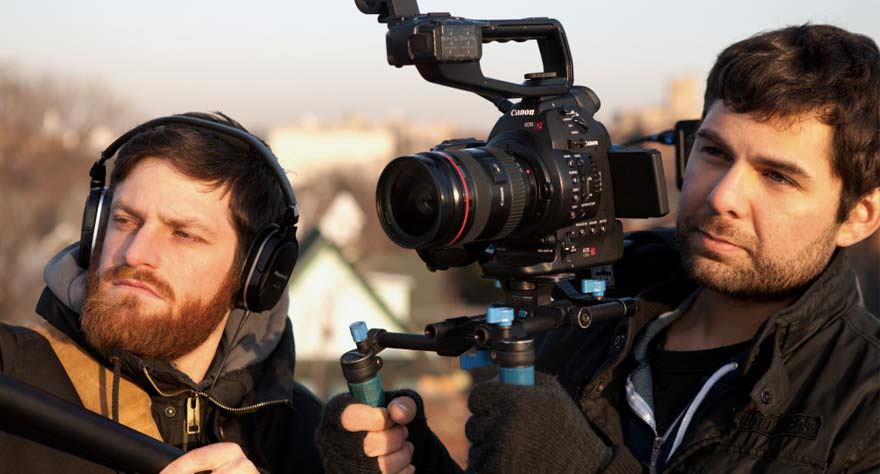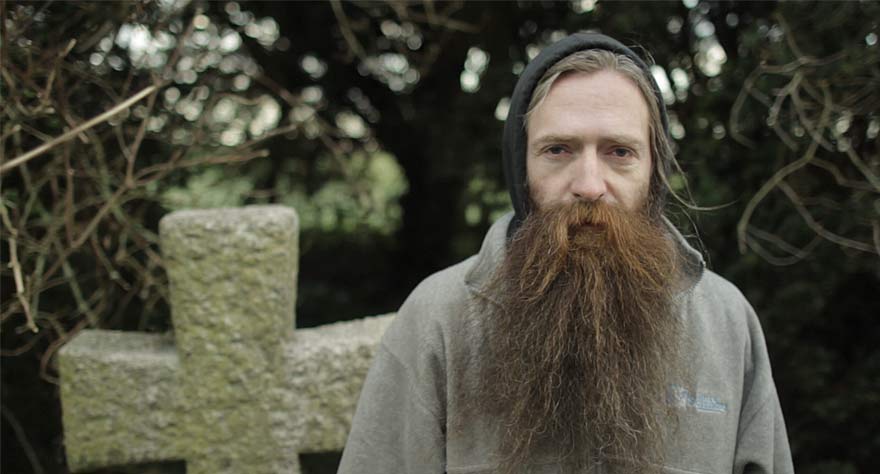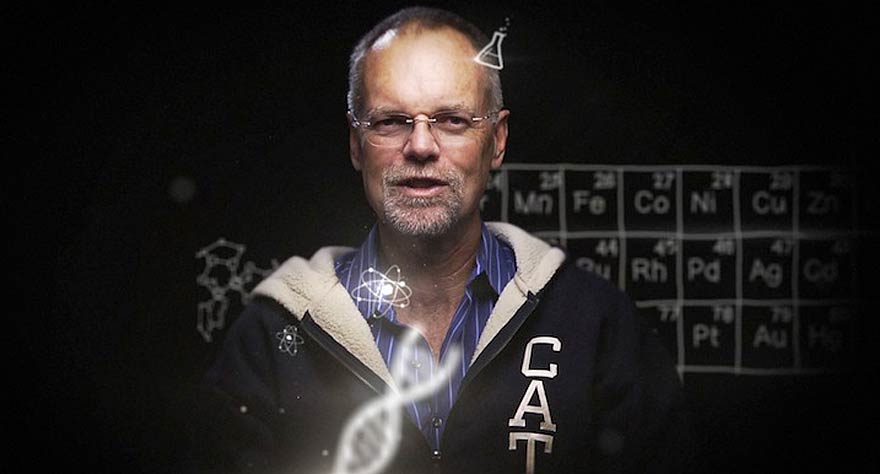The Immortalists Co-Directors Discuss Life Extension & Making Documentaries Look Cinematic

Young documentarians David Alvarado and Jason Sussberg stumbled into a bizarre, fascinating section of the scientific community when Sussberg first learned of a group of scientists focused on “curing death.” These scientists face criticism and skepticism of all types in their pursuit of life extension, yet the determination of these intellectuals pushes the movement continually forward. In their new film The Immortalists, Alvarado & Sussberg shift the focus of this subject from the science itself to the people who have given their lives to these studies. Specifically two men, Bill Andrews who was the first to successfully identify human telomerase, and Aubrey de Grey, the long, red-bearded eccentric featured in much of the documentary’s promotional material. What compels someone to look for a cure to aging?
As screenings of the film expand across the United States, the filmmakers chatted with Way Too Indie about spending time with Aubrey de Grey and Bill Andrews, Aubrey’s disliking of the title The Immortalists, and getting the documentary to look like a narrative film.
What lead you down the path to make The Immortalists?
David: Jason and I both went to graduate school together. Stanford University has this Masters of Fine Arts Documentary program. Right after we graduated, we were both hired for this project in the Stanford music department where we were working for a couple of month on this art installation video music piece, and during that time we started talking about this community that Jason had recently discovered in the Bay Area that thought that aging wasn’t only something that should be destroyed but that they think they had the ideas of how to do it. So Jason and I were, right away like, “What are the consequences of that? If you’re to do that, is that even something that’s possible.” We just never took it seriously as an idea before, as old as the idea was. Once we started to have those conversations we realized, well you know what? Maybe this could be the first film we do. We could team up and do a documentary about this strange community of fascinating scientists.
So were you primarily interested in the themes of immortality and life science, or was it these guys, these subjects that you found?
Jason: We actually started the film as a science-based survey of the various researchers who were working in life extension and we thought it was going to be of all things a 3D documentary. It sounds silly but we actually shot about 10-15% of the film that people can watch today was shot with a 3D camera. We started out by focusing on various, different scientific theories of curing aging and it was sort of this rambling, talking head-style thing.
Then we dove a little deeper. We started to hang out more with Aubrey [de Grey] and get to know the scientists as people. There had been a few other films out there about curing aging and about living forever, so we sort of pivoted and took a different approach, and that was to focus on the people behind the lab bench and to take a deep dive into the scientists themselves, who they are and what their motivations are.
Was the focus always on Aubrey de Grey and Bill Andrews or did you discover that those were the more fascinating figures you could focus on?
David: Aubrey de Grey is super famous in his field so we found him right away during research and of course he has this long, red beard. He’s always got a beer in his hand and he just talks so fast and says such interesting things. We just knew that he’d be great in the film. So we got him really early on. But then we were just marching along with the film and got a phone call out of the blue from this guy Bill Andrews, who of course becomes one of the central forces behind the film, and he just sort of asks me bluntly like, “Wait a minute, why are you doing a film about longevity and you’re not including me? I’m the telomere guy.” And you know, we kind of rolled our eyes. We were like, “Who is this guy? What’s his deal?” We decided to go down to his laboratory in Reno and check him out and pretty much right away we realized that Bill is such a bold character who is so sure of himself that he’s going to save his and his father’s life. That there’s something about his boldness that captures the spirit of the community that interested us in this world of life extension. So we eventually agreed with him that the film needed him in it.
Did either of you have any thoughts about mortality in this context, or life extension, before going into the project?
David: I personally, as a science-minded person, I immediately activated my skepticism which is what I think everyone should do. I said, “No way is this possible, I haven’t heard anything that’s convincing.” But after spending time in the community and looking at their proofs of concept, looking what’s behind the idea, I had a small shift in that I realized maybe none of these people are going to do anything about it, maybe nothing’s ever going to happen, but it is true that in principle there’s nothing magical about the aging process.
There’s no known part of the aging process that prevents us from fully understanding what that process of aging is, and therefore theoretically if we had the tools and the technology to reverse that process, which we still don’t even know fully about right now, if we could reverse that process then it’s in principle doable. So that was a small shift for me, having to really spend some time thinking about it, whereas my first reaction as a science enthusiast was to just reject it right away.
Being around these minds, people who are so single-mindedly focused on finding these “cures,” do you find yourself getting wrapped up in that movement in a sense? Were you a bigger proponent of it during the process of making the film?
Jason: I think anytime you’re around anybody who is mission driven and who is a part of any movement it’s infectious. Certainly our two scientists are extremely charismatic so there certainly was an element of excitement being around people who are so compelling and have a view that’s just radical. That’s just like 100% different than the way other people think. So I think there’s a certain amount of drinking the Kool-Aid that happens when you’re filming people like this.
But I think we always had a healthy distance between where our own beliefs were and what was good for the film. At the end of the day we’re not scientists, we’re not movement people, we’re not here to join any movement be it political or scientific, but we are trying to make the best possible story. I think we were sort of serving as storytellers and filmmakers so I think it was quite easy to keep an arm’s distance from becoming full-throated, flag-waving radical life extensionists.

With Aubrey particularly, he’s such a personality and you’re immediately drawn to him when you see him. Was it overwhelming at times or is he consistently charming?
David: He’s charming and he’s engaging for sure. It’s funny, we’ve worked with different film subjects in the past and he’s a different type of person. He’s so sure of himself, he won’t even entertain ideas that are opposite to him because in his mind he’s already considered them and rejected them long ago, “So why are you even bringing this up to me?” It’s like he has an impatience with everybody who doesn’t agree with him. So it was frustrating at times but also mildly entertaining to be around somebody with such a big personality.
Jason: We should also mention that he’s an incredibly fun guy to hang out with as a person who lives life to the absolute fullest. Both Bill and Aubrey, but Aubrey especially. He greets the day with an eleven o’clock beer, he’s an incredibly social person, he’s whip smart, his interests lie far beyond just aging. He’s absolutely to this day somebody that I would love to have a beer with, even after the four years are over, being in his presence is alluring.
I read that Aubrey actually takes some issue with the title The Immortalists, is that true?
David: Yes, he doesn’t like that title The Immortalists because for him it confuses the issue of living healthier, longer with the literal term immortality which means like, if you got hit by a bus you wouldn’t die because you’re immortal. If you got your head knocked off you wouldn’t die because you’re immortal. So he sees it as like a PR issue, where people are confusing those things.
And for us, we chose the title The Immortalists because the quest to live longer, to avoid death is something that’s sold as human history. The first tale that we ever had written down as a species is the tale of Gilgamesh is a king in Mesopotamia who tries to find the secret to never dying. So this is a very, very old idea, this idea of not having to be mortal. And so for us the title The Immortalists goes back to that concept. The concept that this is something that’s as old as time.
Jason: Aubrey’s aware that we are making a film that’s a story that is something that we… our goals are different. Aubrey’s goal is to be a PhD having scientist who’s trying to spearhead the crusade to defeat death. Our goal is to tell a really interesting story from beginning to end. While he doesn’t like the title and has told us to our face [laughs] at the same time there’s a certain level of understanding.
Switching the subject back to the filmmaking, did you guys have a sparse crew or did you get to bring people along to help you make the doc?
David: It was basically just Jason and myself. I shot it, Jason recorded audio. Even when we brought in an editor, we had two different editors, we were sitting right there on different machines editing different scenes. So we had our hands on everything and the crew was a skeleton crew for sure.
Jason: We had the good fortune of also partnering with really some incredible talents that we didn’t know before the film started and we didn’t even know that we were going to be able to work with these excellent people. Just need to give a quick shout out to Peter Albrechtsen who’s just an amazing sound designer, he’s done just amazing films and on a lark I contacted him on twitter and asked if he’d be interested in doing basically a low to no budget indie doc. To my surprise, he messaged me back the same day, and took a look at the cut, and immediately wanted to jump on board and wanted to help us with the sound design. That’s probably the thing David & I are most proud of is the way the film sounds.

Beyond the sound, the film is shot really beautifully, particularly for a documentary. It looks like a narrative. You mentioned you worked with a skeleton crew, what were some of your challenges to get the film to look as visually compelling as it did?
David: Well, my answer to that is that as a cinematographer, freelance DP and the guy who shot the film, for me the answer is the same as Bill & Aubrey’s answer on how to live forever. The answer is technology. DSLR cameras, and other cameras that are proven beyond the DSLR world… that equipment is becoming so powerful and so cheap that you can produce cinema quality images for low-cost, and a relatively small crew. I think our standards for how documentaries look will be and ought to be going up as that technology becomes more and more available to filmmakers.
Jason: [laughs] I think Dave’s being incredibly modest, it obviously takes a technician, an operator, and a craftsman to be able to use any piece of technology. But I think David is just a tremendous talent and really had been working on a few other documentaries before this, but this was an opportunity or us to be kids in a candy store, and not really have a timeline necessarily. We were trying to make the best possible film imaginable so we had the benefit and the privilege of going back and re-shooting scenes that didn’t work, or really choose the best of the best shots. But yeah, I think David’s being modest, I think he’s an incredible cinematographer and I’m lucky to work with him.
Yeah, I have an all right DSLR myself and I haven’t shot anything that looks quite like this.
David: [laughs] Well I don’t know but there’s tricks though. Maybe this is off point a little but people who use DSLRs, they don’t have internal neutral density filters, and they don’t want to get the matte box. So for example, they think there’s a technological limitation there so they’ll go ahead and you know, they won’t worry about bringing the stops down to 22 and then that creates that moiré effect. There’s other gear that you can buy that can help you have quick access to neutral density filters, like a variable polarizer, variable ND filter, that then you can have the aperture that you want but still get it quickly, which is good for a documentary. So it seems like that was like, “Oh how did you get that exposure outside, that must be good shooting.” And I guess it’s true you had to think about this stuff in advance, but really at the end of the day I can expose properly outside because the gear exists to make that practical within a small crew documentary film.
Was there a conscious decision to make it look not like a typical documentary?
David: Yeah, for me it would be the fact that Jason and I would go to all these shoots and before we would even take out the equipment, we would ask ourselves, what is this scene going to do in the film? What does it look like and how can we achieve that in a visual way? So before we showed up on set, we would sit down at the bar or the coffee shop and draw out storylines and try and figure out how to make this work on a visual level. Then, by the time we showed up on set or to the person’s house or to the person’s laboratory, we had an idea of exactly what we needed to make that scene work, and what that scene was going to do.
So that seems to me that it’s different, a little more like a fiction film than what most people expect out of a documentary. Whereas other young documentary filmmakers might just show up and say, “Well this is a documentary, let’s just start rolling the camera and see what we find.” Jason and I tried very intentionally not to allow ourselves to do that.
You both mentioned that you’re science-minded people, so on that note, is the idea for audiences to expand their understanding of what is possible? Keeping an open mind to what you’ve presented in The Immortalists.
Jason: Yeah I think that’s a good way to put it. I think more importantly than keeping an open scientific mind, or more important than people having a scientific understanding is to approach the film knowing you’re going to go on an interesting ride with two incredibly charismatic, weird, wonderful, strange people. We’re really kind of peeling back the curtain and seeing who these people are as human beings. Along the way you’ll walk away with a functional understanding of how some of this science works and what their various approaches are. But really, it’s just a character study of not how to live forever, but who wants to live forever. Who are the people who want to, and what are their motivations.
